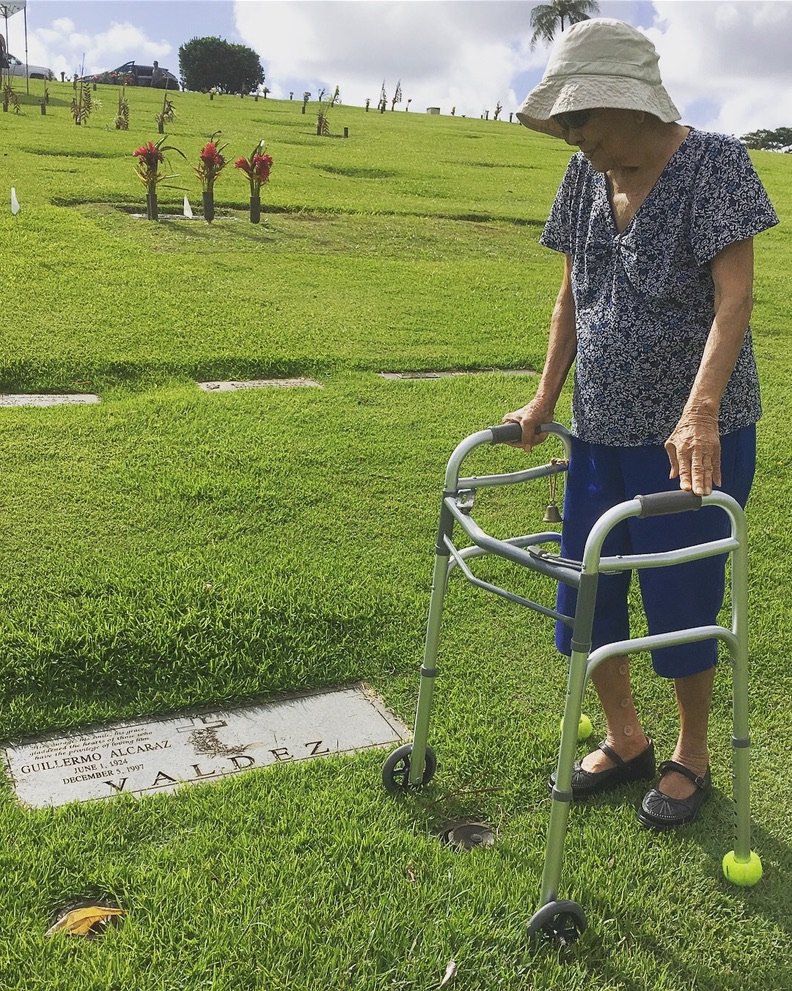Undas 2023: The privileges of memory and mourning
My grandma at my grandpa’s grave in 2008. Our offerings include plants form our backyard, some merienda items for atang, and fresh lei my cousin and I received at our high school graduation.
My grandma was always the culture keeper in our family. She knew the protocols for every death—what prayers to say, foods to eat, and when; how to prepare our homes and our bodies to prevent any potential spirit disturbances.
I absorbed a lot of this because we lived in the same house, and because I was eager to learn about our language and customs. One thing I did with her on every death milestone and birthday of a deceased loved one (which she hand wrote, every year, into the free wall calendars she would get on New Year’s Eve from whichever cousin was working at the bank) was to pray.
I loved watching her strike the box matches. It always felt dangerous, even though she was never afraid of getting burned. I loved the sound the match made when it finally caught fire, the smell of the sulfur and smoke, and how the wax dripping down the side of the tapered red candles looked like fresh drops of blood.
Once the candles were lit, my grandma would carefully unfold a worn piece of small stationery paper from some hotel room in downtown Las Vegas, which contained, in her precise cursive, the name of every deceased person we would pray for. This is how I learned the names and stories of my ancestors. She would pray in Ilocano—some Catholic prayers, some she her own words—as I listened, concentrated, and focused on the flames.
When the prayers were done, sometimes we would eat some ninyogan or baduya together, if she remembered to make it. Maybe watch some Wheel of Fortune, then go to bed.
On November 1, or the Saturday soonest after that date, we would repeat this ritual at the graveyard for my grandpa and all our ancestors. This looked like cutting two big bundles worth of birds of paradise, red ginger, and ti leaf from the backyard the night before, then waking up early to get on H-3 and make the trek from Pearl City to Hawaiian Memorial Park. We would bring tupig, sinuman, and sometimes something savory for atang, but the main thing was always the prayer.
The hardest part was always battling the Kāneʻohe rain and wind; we would do our best to shield the candles with my grandma’s umbrella, but it was so flimsy that if it was too windy, it would flip inside out and tumble away. Whoever was standing out of the kids had to be on umbrella fetching duty, and balance running as fast as you could without stepping on any headstones.
That was a long time ago. Now, my grandma is not as mobile, and I don’t live on O’ahu anymore. It’s been years since I have gone to the graveyard with her. It’s hard for her to walk. Her memory has faded; she no longer remembers the names of her grandparents. That Vegas stationery paper has long been lost.
“Take a picture of me looking like this” — Grandma Martina, 2018. The last time I took her to the graveyard.
Those days when my grandma was stronger felt more safe. It felt like our family’s history and rituals were less at risk of being forgotten and lost.
I wish I had asked more questions and tried harder to learn Ilocano. I wish I had stepped into my gifts earlier in my life when I could have talked to her about it. I know that her mother, Lola Agueda, was sensitive like me, but I had no idea about my grandma. I can still ask her, but there is so much that she doesn’t remember, and it’s hard when I kind of freak out her caretaker whenever I visit and bring this stuff up.
My grandma is not a perfect angel by any means. Who is? But when it comes to our connection with our ancestors, I’m still so privileged to have grown up with her, and to be included in these rituals and prayers. I have a lot of gratitude for bring born into a family where my abilities are accepted, and my special connection with the spirit realm is encouraged—even if they are not totally understood.
A lot of folks do not get to have that. Many peoples’s spiritual and cultural practices around death have not survived colonization.
Many people cannot mourn. The people of Gaza right now are experiencing violence and death at a horrifying pace. How can you grieve and remember your deceased loved ones when the occupying force robs you of your loved ones, land, and funeral rites?
I’m so lucky to be home on O’ahu for Undas and to have the space to remember my ancestors and engage in our cultural and spiritual practices in peace. As part of my spiritual practice, I am doing work this ancestor veneration season in the material and spiritual realms towards a future where Palestinians, and all people, can do the same.
Rest in peace to the recently fallen Gazans, and to all Palestinians and innocents killed in this 75-year bloody occupation. We mourn you. We remember you. Palestine will be free.


